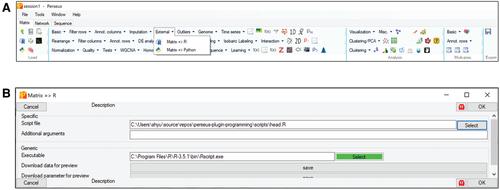下载PDF
{"title":"扩展珀尔修斯软件组学数据分析与自定义插件","authors":"Sung-Huan Yu, Daniela Ferretti, Julia P. Schessner, Jan Daniel Rudolph, Georg H. H. Borner, Jürgen Cox","doi":"10.1002/cpbi.105","DOIUrl":null,"url":null,"abstract":"<p>The Perseus software provides a comprehensive framework for the statistical analysis of large-scale quantitative proteomics data, also in combination with other omics dimensions. Rapid developments in proteomics technology and the ever-growing diversity of biological studies increasingly require the flexibility to incorporate computational methods designed by the user. Here, we present the new functionality of Perseus to integrate self-made plugins written in C#, R, or Python. The user-written codes will be fully integrated into the Perseus data analysis workflow as custom activities. This also makes language-specific R and Python libraries from CRAN (cran.r-project.org), Bioconductor (bioconductor.org), PyPI (pypi.org), and Anaconda (anaconda.org) accessible in Perseus. The different available approaches are explained in detail in this article. To facilitate the distribution of user-developed plugins among users, we have created a plugin repository for community sharing and filled it with the examples provided in this article and a collection of already existing and more extensive plugins. © 2020 The Authors.</p><p><b>Basic Protocol 1</b>: Basic steps for R plugins</p><p><b>Support Protocol 1</b>: R plugins with additional arguments</p><p><b>Basic Protocol 2</b>: Basic steps for python plugins</p><p><b>Support Protocol 2</b>: Python plugins with additional arguments</p><p><b>Basic Protocol 3</b>: Basic steps and construction of C# plugins</p><p><b>Basic Protocol 4</b>: Basic steps of construction and connection for R plugins with C# interface</p><p><b>Support Protocol 4</b>: Advanced example of R Plugin with C# interface: UMAP</p><p><b>Basic Protocol 5</b>: Basic steps of construction and connection for python plugins with C# interface</p><p><b>Support Protocol 5</b>: Advanced example of python plugin with C# interface: UMAP</p><p><b>Support Protocol 6</b>: A basic workflow for the analysis of label-free quantification proteomics data using perseus</p>","PeriodicalId":10958,"journal":{"name":"Current protocols in bioinformatics","volume":"71 1","pages":""},"PeriodicalIF":0.0000,"publicationDate":"2020-09-15","publicationTypes":"Journal Article","fieldsOfStudy":null,"isOpenAccess":false,"openAccessPdf":"https://sci-hub-pdf.com/10.1002/cpbi.105","citationCount":"14","resultStr":"{\"title\":\"Expanding the Perseus Software for Omics Data Analysis With Custom Plugins\",\"authors\":\"Sung-Huan Yu, Daniela Ferretti, Julia P. Schessner, Jan Daniel Rudolph, Georg H. H. Borner, Jürgen Cox\",\"doi\":\"10.1002/cpbi.105\",\"DOIUrl\":null,\"url\":null,\"abstract\":\"<p>The Perseus software provides a comprehensive framework for the statistical analysis of large-scale quantitative proteomics data, also in combination with other omics dimensions. Rapid developments in proteomics technology and the ever-growing diversity of biological studies increasingly require the flexibility to incorporate computational methods designed by the user. Here, we present the new functionality of Perseus to integrate self-made plugins written in C#, R, or Python. The user-written codes will be fully integrated into the Perseus data analysis workflow as custom activities. This also makes language-specific R and Python libraries from CRAN (cran.r-project.org), Bioconductor (bioconductor.org), PyPI (pypi.org), and Anaconda (anaconda.org) accessible in Perseus. The different available approaches are explained in detail in this article. To facilitate the distribution of user-developed plugins among users, we have created a plugin repository for community sharing and filled it with the examples provided in this article and a collection of already existing and more extensive plugins. © 2020 The Authors.</p><p><b>Basic Protocol 1</b>: Basic steps for R plugins</p><p><b>Support Protocol 1</b>: R plugins with additional arguments</p><p><b>Basic Protocol 2</b>: Basic steps for python plugins</p><p><b>Support Protocol 2</b>: Python plugins with additional arguments</p><p><b>Basic Protocol 3</b>: Basic steps and construction of C# plugins</p><p><b>Basic Protocol 4</b>: Basic steps of construction and connection for R plugins with C# interface</p><p><b>Support Protocol 4</b>: Advanced example of R Plugin with C# interface: UMAP</p><p><b>Basic Protocol 5</b>: Basic steps of construction and connection for python plugins with C# interface</p><p><b>Support Protocol 5</b>: Advanced example of python plugin with C# interface: UMAP</p><p><b>Support Protocol 6</b>: A basic workflow for the analysis of label-free quantification proteomics data using perseus</p>\",\"PeriodicalId\":10958,\"journal\":{\"name\":\"Current protocols in bioinformatics\",\"volume\":\"71 1\",\"pages\":\"\"},\"PeriodicalIF\":0.0000,\"publicationDate\":\"2020-09-15\",\"publicationTypes\":\"Journal Article\",\"fieldsOfStudy\":null,\"isOpenAccess\":false,\"openAccessPdf\":\"https://sci-hub-pdf.com/10.1002/cpbi.105\",\"citationCount\":\"14\",\"resultStr\":null,\"platform\":\"Semanticscholar\",\"paperid\":null,\"PeriodicalName\":\"Current protocols in bioinformatics\",\"FirstCategoryId\":\"1085\",\"ListUrlMain\":\"https://onlinelibrary.wiley.com/doi/10.1002/cpbi.105\",\"RegionNum\":0,\"RegionCategory\":null,\"ArticlePicture\":[],\"TitleCN\":null,\"AbstractTextCN\":null,\"PMCID\":null,\"EPubDate\":\"\",\"PubModel\":\"\",\"JCR\":\"Q1\",\"JCRName\":\"Biochemistry, Genetics and Molecular Biology\",\"Score\":null,\"Total\":0}","platform":"Semanticscholar","paperid":null,"PeriodicalName":"Current protocols in bioinformatics","FirstCategoryId":"1085","ListUrlMain":"https://onlinelibrary.wiley.com/doi/10.1002/cpbi.105","RegionNum":0,"RegionCategory":null,"ArticlePicture":[],"TitleCN":null,"AbstractTextCN":null,"PMCID":null,"EPubDate":"","PubModel":"","JCR":"Q1","JCRName":"Biochemistry, Genetics and Molecular Biology","Score":null,"Total":0}
引用次数: 14
引用
批量引用
Expanding the Perseus Software for Omics Data Analysis With Custom Plugins
The Perseus software provides a comprehensive framework for the statistical analysis of large-scale quantitative proteomics data, also in combination with other omics dimensions. Rapid developments in proteomics technology and the ever-growing diversity of biological studies increasingly require the flexibility to incorporate computational methods designed by the user. Here, we present the new functionality of Perseus to integrate self-made plugins written in C#, R, or Python. The user-written codes will be fully integrated into the Perseus data analysis workflow as custom activities. This also makes language-specific R and Python libraries from CRAN (cran.r-project.org), Bioconductor (bioconductor.org), PyPI (pypi.org), and Anaconda (anaconda.org) accessible in Perseus. The different available approaches are explained in detail in this article. To facilitate the distribution of user-developed plugins among users, we have created a plugin repository for community sharing and filled it with the examples provided in this article and a collection of already existing and more extensive plugins. © 2020 The Authors.
Basic Protocol 1 : Basic steps for R plugins
Support Protocol 1 : R plugins with additional arguments
Basic Protocol 2 : Basic steps for python plugins
Support Protocol 2 : Python plugins with additional arguments
Basic Protocol 3 : Basic steps and construction of C# plugins
Basic Protocol 4 : Basic steps of construction and connection for R plugins with C# interface
Support Protocol 4 : Advanced example of R Plugin with C# interface: UMAP
Basic Protocol 5 : Basic steps of construction and connection for python plugins with C# interface
Support Protocol 5 : Advanced example of python plugin with C# interface: UMAP
Support Protocol 6 : A basic workflow for the analysis of label-free quantification proteomics data using perseus



